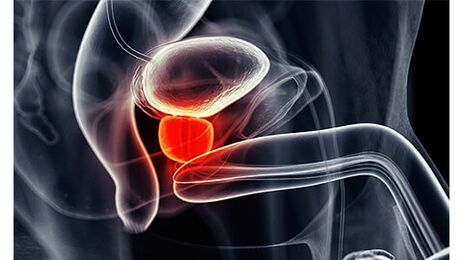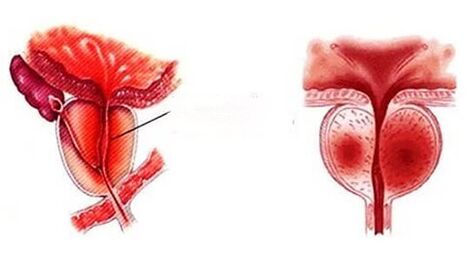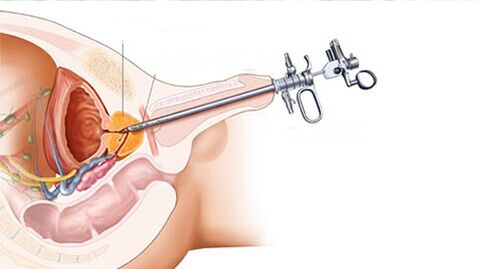
Chronic prostatitis is a slow disease of the prostate.For him, as far as any other chronic pathologies are concerned, there is a characteristic change in periods of exacerbation and remissions.The disease develops slowly without delivering almost no anxiety to the patient in the early years, except for single symptoms that often do not pay attention.However, the progression of the pathology is able to lead to impaired prostate gland function and the development of complications, therefore it is important to identify it at an early stage.
You can undergo a preventive examination of the urologist at the field clinic.If necessary, an individual treatment regimen will be developed for you, thanks to which you will get rid of the disease for a short time and avoid complications.
Characteristics of the disease
Chronic prostatitis in men is one of the most common pathologies of the genius system.About 30% of patients from 20 to 50 suffer.
The prostate gland is a non -paralele organ located under the bladder.It is responsible for the quality of the semen: it produces a special secret, which is an important component.And during the erection, the iron of the prostate closes the outlet of the bladder.
The cause of the development of acute and chronic prostatitis is often infections (bacterial, viral or fungal origin).They are able to penetrate the prostate gland through blood, lymph, even if the focus of the infection is far from the prostate.Also, the infection often enters the prostate gland directly from the urethra.These two organs are interconnected: the prostate ducts open to the urethra.And also through the prostate gland passes the original part of the urethra.

The infection can be indicated in the prostate even without the presence of pathological processes in the body.In the end, each organ is characterized by its own microflora.The microorganisms that live in the urethra are harmless in their "habitat".However, for the prostate gland, they can be alien and if they fall into it, they can cause the development of inflammation.
Prostatitis can be:
- Infectious origin - caused by bacteria, viruses or fungi.
- Stagnant in nature - develops with stagnation of prostate secretion.
The causes of the development of the disease
The causes of development depend on the form of chronic prostatitis.The infectious form occurs in the following diseases:
- Urethritis.
- Orchitis (testicular pneumonia).
- Cystitis.
The source of infection should not be located in the immediate vicinity of the prostate gland.The pathology can occur against the background of other infections that progress in the body: caries, sinusitis, pneumonia, bronchitis and more.
Also, chronic prostatitis is able to develop as a result of an uneven acute process of bacterial origin.
The stagnation of prostate secretion occurs due to stagnation of blood in the pelvic organs, which may be due to:
- An irregular sex life.
- Sedimentary.
- Wearing tight underwear.
- Bad habits (alcohol abuse, smoking).
The stagnant form is found in 85% of cases of chronic prostatitis.
Factors that increase the risk of developing the disease in both forms include:
- Regular microtraums, bruising of the pelvic organs.
- Improper meal.
- Nervous overloads.
- Reverse sex life.
- Hypothermia and a long stay in an increased moisture environment.
These factors either cause a worsening of the blood supply to the pelvic organs or increase the possibility of penetration of infection into the prostate gland.
The diagnosis of chronic prostatitis is made to representatives of some professions more often than people with different types of activity.The risk group includes:
- Trucks and other drivers (forced to be at the same time for a long time).
- Programmers, office workers (sedentary lifestyle).
- Fishermen (stay in the cold for a long time).
- Professional athletes: football players, fighters, volleyball players, basketball players (often risk injury in the pelvic area).
- Sailors and geologists (facing adverse weather conditions: cold, moist).
Chronic Prostatitis: Symptoms

Symptoms of chronic prostatitis are:
- Chat pain, at the lower abdomen: they can be given to the rectum, sacrum.
- Erection disorders, premature ejaculation, lack of ejaculation.
- Urination disorders: frequent urge to urinate, difficulty emptying the bladder, pain during urination.
In the early stages of chronic prostatitis, the symptoms are weak.The pain is insignificant and pass.Urination disorders also occur incorrectly.Therefore, the patient often does not give these symptoms of these symptoms and does not consult a doctor.He comes to the reception, even when the signs of the disease are clearly expressed.
Even if there are rare symptoms to consult a doctor, otherwise the disease can lead to complications.
Complications of chronic prostatitis
The presence of a constant focus of the infection can lead to its spread in other organs and the development of pathologies in them.Complications of chronic prostatitis are:
- Cystitis is an inflammation of the bladder.
- Pyelonephritis - purulent inflammation of the kidneys
- Vesiculitis - inflammation of the seeds bubbles.
- Orchoepididymitis - inflammation of the testes and their appendages.
The inflammatory diseases of the geniopolous system, in turn, are able to bring:
- To infertility.
- to prostate cancers.
- To prostate adenoma.
Reference!In chronic prostatitis, erectile dysfunction often develops.This is due to the fact that the nerves responsible for the erection pass through the prostate gland.When a pathological process develops in it, it often affects them.
Diagnostics
To identify the disease, you must visit a urologist or andrologist.First, the doctor will gather the anamnesis: he will listen to complaints and ask questions.Then he will perform a visual inspection and viewing of the prostate finger.In addition, the following types of studies may be required:
- Bacteriological examination of urine.
- Microscopic examination of prostate secretion.
- Prostate ultrasound.
- Sperm.
- Urethra smear (to identify sexually transmitted infections).
- Prostate biopsy.
Treatment of chronic prostatitis
The treatment of chronic prostatitis is mainly conservative.Surgically is performed only if the therapy does not produce the necessary result or complications occur:
- Prostate or surrounding tissue abscesses.
- Prostate cancer.
- Prostate adenoma.
- Severe pathologies of the urethra.
Conservative treatment includes appointment:
- Medicines: non -steroidal anti -inflammatory drugs, antibiotics, alpha blockers, immunomodulators, medicines, acceleration of regeneration.In severe pain, drug blocks may be prescribed.
- Prostate massage.Allows you to remove stagnant phenomena, improve blood circulation in the affected area and leakage of prostate secretion.However, before prescribing a massage, additional studies are conducted, as this may worsen the condition under some conditions.
- Physiotherapy procedures.Most often it is prescribed: magnetic therapy;electrophoresis;laser therapy;Ultrasound therapy.
- Diets.It helps: eliminating the risk of worsening inflammation, improving the digestive tract, increased immunity, reducing the load in the internal organs, normalizing blood circulation throughout the body.It is necessary to eat non -structuring with food, stewed, cooked or baked in the oven, with a minimum of salt.The basis of the diet for chronic prostatitis is low fat fish, lean meat (chicken meat, turkey, rabbit, beef), cereals, vegetables, pasta made of whole grains, light soups.It is necessary to exclude: fried, spicy, fats, smoked, salted foods, canned foods, semi-finished products, fast food, mushrooms, spices, including onions and garlic, citrus fruits, legumes and cabbage, fatty meat, strong tea, alcohol, carton drinks, sweets and concrete.
- In severe cases, surgical treatment is performed. Transurethral resection of the prostate gland - removal of the pathological site or the entire prostate, is performed without abbreviations (the device is introduced by urethra), most often it is prescribed for the development of prostate adenoma.Prostatectomy - Removal of the prostate or its area in the usual surgical manner with the application of sections.

Prevention of chronic prostatitis
In order to prevent the development of the disease, it is important to eliminate all the foci of infection in the body in a timely manner.Regular sex life will be helpful without accidental relationships.A healthy diverse diet and moderate physical activity will boost immunity.It is necessary to avoid hypothermia, prolonged sitting (if this requires work, you need to take breaks and choose), close your underwear.It is also important as a prevention of undergoing urologist examinations annually.






























